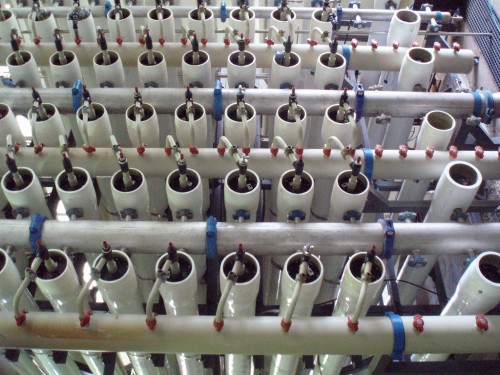Just a couple of things that have come to mind repeatedly while reading the news:
- Instant run-off voting doesn’t make sense to the entrenched parties. Why give the fringe parties a seat at the table? Possible solution: introduce instant run-off in non-party contests like county seat, city council, school board, etc. Over the course of a few elections, people may get used to the idea of not having to settle.
- Nuclear power is safe, and secondary and tertiary-fuel reactors are possible and feasible. Fire a couple up where the fault-lines aren’t.
- Transmission over long distances is inefficient, and centralized production is subject to market manipulation a la Enron or physical disruption. Put some solar-panel factories near the reactors.
- Recently-viable third party forms in-state to reform state constitution and ensure that California taxpayers are getting their fair share back from the feds.
- Take a queue from Germany and give some incentives for private citizens to buy into decentralizing the power grid a bit. More resistant to interruptions in transmission lines (earthquake, fire, etc.), increases in residential population helps offset increase in consumption.
- Continue building nuclear reactors to run desalination projects for Imperial Valley, Los Angeles, San Diego, and other inherently-thirsty areas.
Not a plan, just thinking about some ways to address California’s reliance on its neighbors.

The sun is shining somewhere every freakin’ day and most dwellings have roofs. Hel-LO! Where the hell is the government project to solar cell the crap out of our homes? But hey! We’ve got some juicy, juicy subsidies for you Mr. Oil and you Mrs. Nuke!
-TP
Or even planted roofs… I seriously want to look into this when I purchase my next home.
The main government subsidy that nuclear power gets (to my understanding) is what amounts to a blanket liability waiver should anything go south. For a power company to purchase insurance for the possibility of a meltdown would probably drive prices for them through the roof (who’d want to take that financial risk other than Uncle Sam?)
As for the government solar project, Jimmy Carter launched a solar bank initiative almost thirty years ago (prompted largely by the OPEC issues of the day). Even put solar panels on the White House, but Reagan took them down and stopped the solar initiative. I don’t particularly want the government to force private property owners to mess with their homes (unless they’re somehow harming their neighbors), but they can certainly make things a bit easier. The German model forcing power companies to buy back power from residences at above-market-rate (thus making the panels pay for themselves faster for a home owner) is bad for power companies, but they don’t make for very sympathetic characters these days.
Add to the list: put up a $1billion bounty (or some other adequately-enticing prize) for anybody that can invent a solar panel system that looks just like spanish tile or shingles. Get rid of the aesthetic objection to home solar.
I was all for nuclear power, even though I lived less than 500 miles from Chernobyl. However, I recently read that when quoting how cheap the energy is they tend not to include the costs of preparing the fuel and then getting rid of it. If overall costs are added in it’s not that attractive anymore. I am not quoting any stats here, so I could be wrong.
@Meesha: There’s front-loading on any means of power generation. Gotta do all kinds of stuff to build a dam for geothermal, all the construction involved with wind, wars in the Middle East for petroleum, etc. Solar tends to take a couple years to recoup the initial energy outlay, depending on how the panel is set up. I seem to recall it ranges anywhere from one to six years before a solar panel is a net gain. I don’t remember the numbers on nuclear, and suspect that it takes longer.
http://www.nucleartourist.com/basics/costs.htm – obviously this can be flawed but it shows that nuclear overall is higher.
I thought the problem with solar cell panels is that they use a lot of silver… same reason film is expensive… so they end up being a lot to make? I could be wrong, or totally misrepresenting the facts.
@meesha: good point, though I see they didn’t factor in decommission/cleanup costs for coal plants. Odd, as the waste-products from burning massive amounts of coal are pretty hazardous. Anyhow, I don’t see California firing up a bunch of coal-burning power plants in the near future.
@chunkbot: Yep. It’s an excellent conductor, and the amount of silver used in those things is certainly something that can be fine tuned as mass production gets its act together. Apparently a lot of recent breakthroughs in increasing the efficiency of these things actually involves impregnating the silicone crystal with silver, but that’s even further outside my areas of expertise. Any time you want to mass-produce something, you run the risk of pushing up the price of the materials consumed in production.
Lay off the SimCity, John.
I have to admit i always was obviously a little leary of all the hype taking place around solar. After thinking about quite a lot of programs and purchase options my spouce and i chose to take the plunge. We ended up getting solar with no money down and immediatly started saving cash the very first month is was installed. I must say that this advantages of solar seem to be real and I am very happy that we thought to move forward with it.